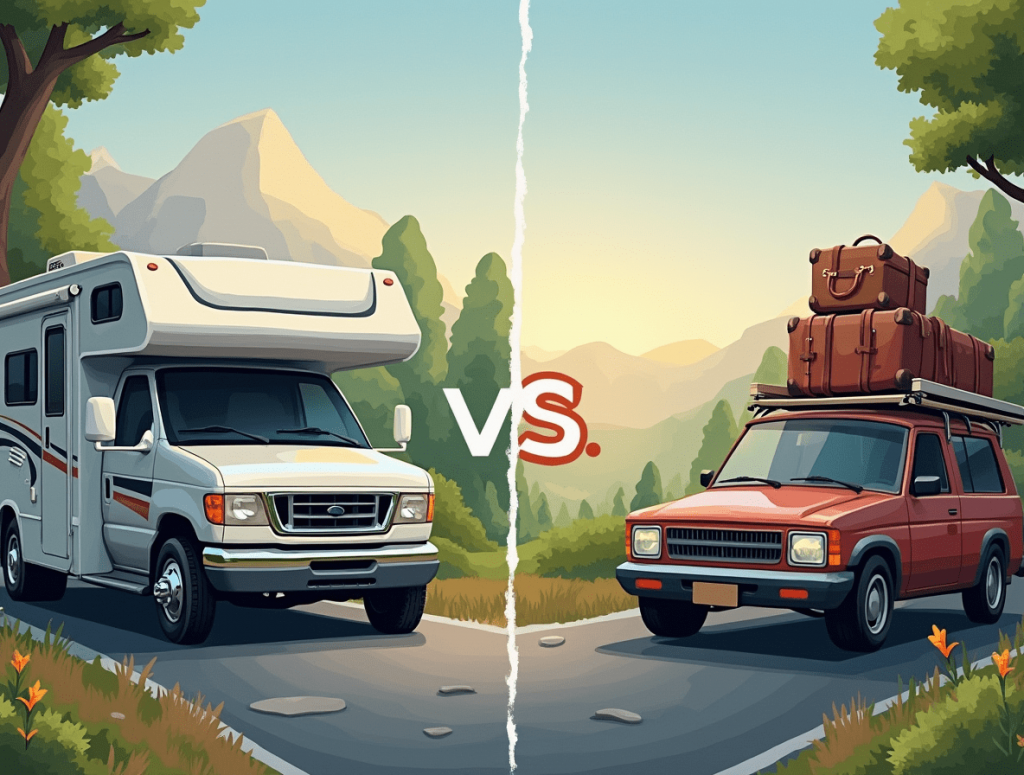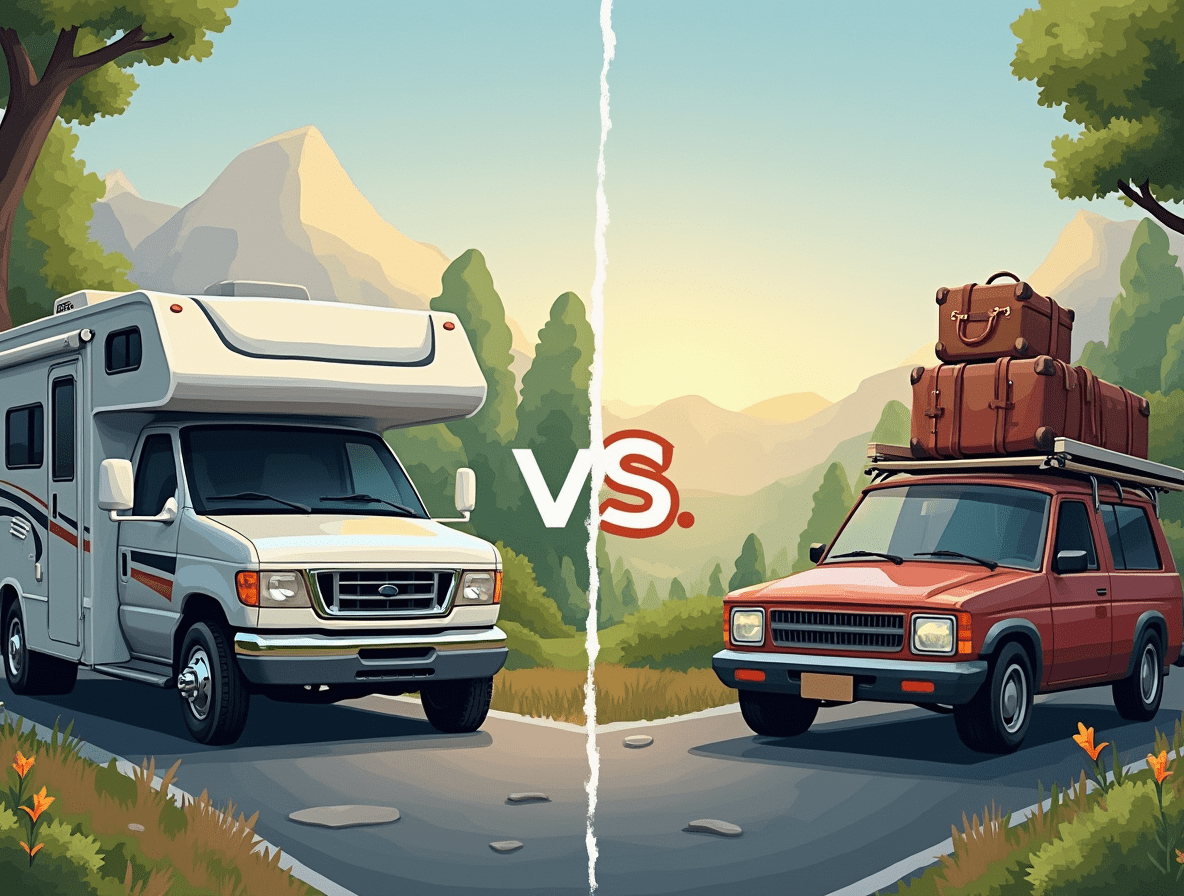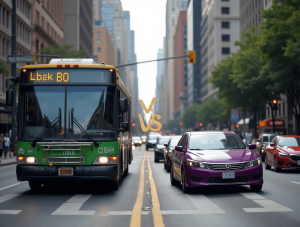
Did you know that Americans took over 225 million road trips last year, with RV rentals increasing by 650% since 2019? As travel preferences evolve, more people are questioning which road trip style delivers the most enjoyable experience.
If you’re planning your next adventure, you might be wondering whether to pack up the family car or rent/buy an RV. Both options offer unique advantages and potential drawbacks that can significantly impact your travel experience.
This comprehensive guide breaks down the key factors that determine enjoyment—including accommodation comfort, freedom and flexibility, cost considerations, and overall travel experience—to help you choose the road trip style that best matches your preferences and travel goals.
Understanding Your Options
What is RV Travel?
RV (Recreational Vehicle) travel involves hitting the road in a vehicle that combines transportation and living quarters. Modern RVs range from compact campervans to luxurious motorhomes with multiple slide-outs and high-end amenities.
Common RV types include:
- Class A Motorhomes: Large, bus-shaped vehicles (25-45 feet) with spacious living areas
- Class B Motorhomes: Camper vans with basic amenities (17-23 feet)
- Class C Motorhomes: Mid-sized options built on truck chassis (20-30 feet)
- Travel Trailers: Towable units requiring a separate vehicle
- Fifth Wheels: Larger towable units that connect to pickup truck beds
What is Traditional Road Trip Travel?
Traditional road trips involve traveling by car, SUV, or van while staying in external accommodations like hotels, motels, vacation rentals, or campgrounds (using tents). This approach separates your transportation from your lodging.
Common traditional road trip approaches include:
- Hotel-hopping: Staying in different hotels/motels each night
- Car camping: Driving to campgrounds and setting up tents
- Vacation rental stays: Using services like Airbnb for multi-night stops
- Mixed accommodation: Combining different lodging types throughout the journey
Key Factors Affecting Enjoyment
Accommodation Experience
RV Accommodations
RVs offer consistent, familiar accommodations that travel with you:
Benefits:
- Your bed, bathroom, and kitchen remain the same every night
- No packing/unpacking at each destination
- Immediate access to personal belongings
- Control over cleanliness and sleeping environment
- Prime locations in national parks and scenic areas
Limitations:
- Compact living spaces (150-400 square feet on average)
- Smaller bathrooms and limited shower facilities
- Beds that may be less comfortable than hotel options
- Temperature management challenges in extreme weather
- Potential for feeling cramped during extended trips
According to recent surveys, 78% of RV travelers cite “consistent accommodations” as a major advantage, particularly for families with young children who benefit from routine.
Traditional Road Trip Accommodations
Traditional road trips offer varied accommodation experiences:
Benefits:
- Full-sized beds, bathrooms, and amenities
- Professional cleaning services
- Room to spread out and relax
- Property amenities like pools, fitness centers, and restaurants
- Climate control options
Limitations:
- Varying quality between locations
- Need to pack/unpack frequently
- Less availability in remote areas
- Higher costs in popular destinations
- Less pet-friendly options
A 2024 travel survey found that 65% of traditional road trippers value the ability to “shower properly” as their top accommodation priority, followed by bed comfort (58%).
Freedom and Flexibility
RV Travel Flexibility
RVs offer unique flexibility advantages:
Benefits:
- Change plans without canceling reservations (outside peak seasons)
- Stay in remote locations away from commercial accommodations
- Make spontaneous stops for as long as desired
- Cook meals on your schedule
- No check-in/check-out times to coordinate
Limitations:
- Size restrictions on certain roads and in urban areas
- Need for advance reservations at popular RV parks during peak season
- Parking challenges in cities and tourist areas
- Driving restrictions during adverse weather
RV travelers report making significant itinerary changes 40% more frequently than traditional road trippers, demonstrating the real-world flexibility benefits.
Traditional Road Trip Flexibility
Car travel offers different flexibility advantages:
Benefits:
- Access to all roads and urban centers
- Easier parking in cities and tourist destinations
- Faster travel between points of interest
- Less concern about vehicle size limitations
- Greater weather resilience
Limitations:
- Reliance on available accommodations
- Need to secure lodging in advance during peak seasons
- Meal timing constrained by restaurant hours
- Daily planning around check-in/check-out times
Traditional road trippers can cover 25-50% more distance per day on average compared to RV travelers, allowing more ground to be covered in limited vacation time.
Cost Considerations
RV Travel Costs
RV travel economics depend significantly on trip length and style:
Typical expenses:
- RV rental: $100-$350 per day depending on class and season
- RV purchase: $70,000-$150,000 for new mid-range models
- Campground fees: $25-$90 per night
- Fuel costs: 8-15 MPG for most motorhomes
- Insurance: $30-$50 daily for rentals
- Kitchen supplies and groceries
- Propane and utilities
For a 14-day trip for a family of four:
- RV rental with campgrounds: $3,500-$6,000
- RV ownership with campgrounds: $1,200-$2,500 (excluding purchase costs)
RV travel becomes more cost-effective as trip length increases and when cooking most meals rather than dining out.
Traditional Road Trip Costs
Traditional road trips involve different expense patterns:
Typical expenses:
- Accommodation: $120-$250 per night for mid-range hotels
- Rental car (if needed): $50-$100 daily
- Fuel costs: 25-35 MPG for most passenger vehicles
- Restaurant meals: $30-$60 per person daily
- Entertainment and activities
For a 14-day trip for a family of four:
- Hotel and meals: $5,000-$8,000
- Car expenses: $500-$1,000
Traditional trips typically cost 15-30% more than comparable RV journeys when accounting for accommodation and meal expenses, though this varies based on travel style and preferences.
Travel Experience Factors
RV Travel Experience
RVs create a distinct travel environment:
Positive experience factors:
- Community aspects of RV parks and campgrounds
- Closer connection to outdoor environments
- More time in nature and scenic locations
- No need to find restaurants for every meal
- Built-in social space for family bonding
- Pet-friendly travel environment
Potential challenges:
- Driving stress for those unused to large vehicles
- Limited personal space and privacy
- Maintenance and systems management
- Learning curve for RV operations
- More exposure to weather conditions
According to RV owner surveys, 84% report that RV travel strengthens family relationships, with the shared experience creating lasting memories.
Traditional Road Trip Experience
Car travel offers alternative experience benefits:
Positive experience factors:
- Separation between travel and relaxation time
- Greater immersion in local communities
- Diverse accommodation experiences
- Less responsibility for maintenance issues
- More walkable access in towns and cities
Potential challenges:
- More time spent packing/unpacking
- Restaurant fatigue on longer trips
- Less connection to outdoor environments
- Potentially less family togetherness time
- More coordination required for daily planning
Traditional road trippers report higher satisfaction with local cultural experiences, with 72% citing meaningful interactions with communities as a highlight of their journeys.
Best Scenarios for Each Travel Style
Different travel scenarios favor each approach:
When RV Travel Shines
RV travel often provides more enjoyment when:
- Exploring national parks and natural areas RVs allow you to stay inside or near parks, maximizing time in nature and minimizing commutes.
- Extended trips (2+ weeks) The longer your journey, the more beneficial RV consistency becomes while the cost advantages increase.
- Traveling with pets RVs eliminate pet accommodation restrictions and reduce stress for animals who prefer consistent environments.
- Off-the-beaten-path destinations RVs enable comfortable stays in areas with limited or no commercial accommodations.
- Multi-generational family travel The shared space facilitates family bonding while providing necessary amenities for all ages.
When Traditional Road Trips Excel
Traditional road trips typically provide more enjoyment when:
- Urban exploration Cars offer easier navigation and parking in cities where RVs face significant limitations.
- Covering long distances quickly Without the slower pace of RV travel, traditional road trips allow you to cover more ground in limited vacation time.
- Luxury preferences Those seeking high-end accommodations and dining experiences generally prefer traditional travel approaches.
- Extreme weather seasons Hotels provide more reliable climate control during very hot or cold conditions that challenge RV systems.
- First-time road trippers The learning curve is gentler without RV systems and driving requirements to master.
Technology and Modern Travel Enhancements
Recent technological developments have improved both travel styles:
RV Travel Technology
Modern RVs incorporate technology that enhances the experience:
- Smart RV systems with mobile app controls
- Solar power options for off-grid camping
- Satellite internet for remote connectivity
- Advanced navigation systems for RV-specific routing
- Compact appliances with improved efficiency
According to industry data, 65% of new RVs now include smart systems integration that simplifies operations for first-time users.
Traditional Road Trip Technology
Technology has similarly improved traditional road tripping:
- Ride-sharing availability in most destinations
- Advanced hotel booking platforms with last-minute deals
- Mobile check-in/keyless entry at many properties
- Navigation apps with offline capability
- Restaurant delivery services in most locations
These advancements have eliminated many traditional pain points, with 83% of road trippers reporting that mobile technology significantly improved their experience.
Environmental Impact Considerations
For environmentally conscious travelers, impact varies between options:
RV Environmental Considerations
RVs present mixed environmental impacts:
- Higher fuel consumption and emissions per mile
- Lower energy use for accommodations compared to hotels
- Opportunity for renewable energy with solar installations
- Potential for responsible boondocking (off-grid camping)
- Growing number of electric RV options entering the market
Recent innovations include electric RVs with 250+ mile ranges and hybrid models that reduce emissions by 30-40% compared to traditional RVs.
Traditional Road Trip Environmental Impact
Traditional road trips offer different environmental profiles:
- Better fuel efficiency per mile traveled
- Higher energy use from hotel operations
- More frequent use of single-use items
- Greater support for local businesses
- Lower overall mileage when flying between regions
Travelers concerned with environmental impact should consider trip length, vehicle efficiency, and accommodation choices regardless of style selected.
Trip Planning Considerations
The planning process differs significantly between these travel styles:
RV Trip Planning
RV trips require specialized planning:
- Reservation timing: 3-6 months in advance for popular destinations
- Route considerations: Vehicle size restrictions, driving time limits
- Campground research: Hookup needs, amenities, site sizes
- Systems understanding: Water, electrical, propane management
- Supply preparation: Kitchen equipment, linens, tools
- Driving skills: Practice with larger vehicle handling
Most successful first-time RV travelers spend 15-20 hours on trip planning to ensure a smooth experience.
Traditional Road Trip Planning
Car trip planning focuses on different elements:
- Accommodation booking: Based on daily driving distances
- Restaurant research: Identifying options along the route
- Attraction tickets: Advance purchases for popular sites
- Packing efficiency: Maximizing limited car space
- Driving segments: Planning reasonable daily distances
Traditional road trip planning typically requires 8-12 hours of preparation for comparable trip lengths.
Conclusion: Which is More Enjoyable?
The enjoyment comparison between RV travel and traditional road trips doesn’t yield a universal answer. Instead, the most enjoyable option depends on:
- Your personal comfort preferences
- Desired connection with nature versus local culture
- Available vacation time
- Budget considerations
- Travel companions and their needs
RV travel tends to deliver more enjoyment for nature-focused travelers who value consistency, self-sufficiency, and a closer connection to outdoor environments. The all-in-one approach creates a unique travel rhythm that many find deeply satisfying once they adapt to the lifestyle.
Traditional road trips typically provide more enjoyment for travelers prioritizing diverse experiences, local culture immersion, comfort amenities, and covering more territory. The separation between travel and accommodation creates clearer boundaries that many find less stressful.
Many experienced road trippers eventually adopt a hybrid approach—using both styles for different types of journeys or even combining them within single trips. For example, renting an RV for national park portions of a journey while using hotels for urban segments.
As travel technologies continue to advance, both styles are becoming more accessible to first-time adventurers. The growing popularity of RV rentals and peer-to-peer sharing platforms has eliminated many barriers to trying both approaches without significant commitment.
The most enjoyable road trip ultimately aligns with your personal travel philosophy—whether you prefer the journey to be the destination (favoring RV travel) or view transportation primarily as the means to reach diverse experiences (favoring traditional approaches).
FAQ Section
How much driving experience do I need for an RV trip?
Most RV rental companies require only a standard driver’s license for vehicles under 26,000 pounds (which includes most recreational RVs). However, practice driving in low-traffic areas before beginning your journey. Many rental companies offer orientation sessions and driving tips. Plan shorter driving days (200-250 miles maximum) when first starting out with an RV.
Can I save money by combining RV and hotel stays?
Yes, many experienced travelers use this hybrid approach. For example, use your RV in expensive destinations like national parks where hotels command premium rates, then opt for hotels in cities where RV parking is challenging and campgrounds may be inconveniently located. This strategy optimizes both cost savings and convenience.
What’s the learning curve for first-time RV users?
Most renters feel comfortable with basic RV operations after 2-3 days. Modern RVs include intuitive control panels and many rental companies provide detailed walkthrough videos. The most challenging aspects typically include dumping tanks, managing power usage, and parking/backing up. Consider booking a stationary night at your first campground to familiarize yourself with systems without the pressure of travel.
How do trip costs compare for families versus couples?
The financial benefits of RV travel increase with group size. For couples, traditional road trips may be only 10-15% more expensive than comparable RV trips. For families of 4+, RV travel typically delivers 25-40% savings compared to hotels and restaurants. Solo travelers generally find traditional road trips more cost-effective unless planning very extended journeys.
Which option works better for working remotely while traveling?
Both options can accommodate remote work, but with different advantages. RVs provide consistent workspace setup and the option to stay in more remote, scenic locations with your office always available. Traditional road trips offer more reliable high-speed internet connections, better separation between work and leisure spaces, and fewer distractions from travel companions during working hours.














